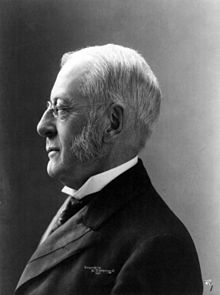Charles W. Eliot
| Charles William Eliot | |
|---|---|
 |
|
| 21st President of Harvard University | |
|
In office 1869–1909 |
|
| Preceded by | Thomas Hill |
| Succeeded by | A. Lawrence Lowell |
| Personal details | |
| Born |
March 20, 1834 Boston, Massachusetts |
| Died | August 22, 1926 (aged 92) Northeast Harbor, Maine |
| Spouse(s) | Ellen Derby Peabody (1858–1869) Grace Mellen Hopkinson (1877–1924) |
| Children |
Charles Eliot Samuel A. Eliot II |
| Alma mater | Harvard College |
| Profession | Professor, university president |
| Religion | Unitarian |
| Signature | |
Charles William Eliot (March 20, 1834 – August 22, 1926) was an American academic who was selected as Harvard's president in 1869. He transformed the provincial college into the preeminent American research university. Eliot served until 1909, having the longest term as president in the university's history. He was a cousin of the Nobel Prize-winning poet T.S. Eliot.
Charles Eliot was a scion of the wealthy Eliot family of Boston, and was the grandson of banker Samuel Eliot. Eliot graduated from Boston Latin School in 1849 and from Harvard University in 1853. He was later made an honorary member of the Hasty Pudding.
Although he had high expectations and obvious scientific talents, the first fifteen years of Eliot's career were less than auspicious. He was appointed Tutor in Mathematics at Harvard in the fall of 1854, and studied chemistry with Josiah P. Cooke. In 1858, he was promoted to Assistant Professor of Mathematics and Chemistry. He taught competently, wrote some technical pieces on chemical impurities in industrial metals, and busied himself with schemes for the reform of Harvard's Lawrence Scientific School.
But his real goal, appointment to the Rumford Professorship of Chemistry, eluded him. This was a particularly bitter blow because of a change in his family's economic circumstances—the financial failure of his father, Samuel Atkins Eliot, in the Panic of 1857. Eliot had to face in the fact that "he had nothing to look to but his teacher's salary and a legacy left to him by his grandfather Lyman." After a bitter struggle over the Rumford chair, Eliot left Harvard in 1863. His friends assumed that he would "be obliged to cut chemistry and go into business in order to earn a livelihood for his family." But instead, he used his grandfather's legacy and a small borrowed sum to spend the next two years studying the educational systems of the Old World in Europe.
...
Wikipedia
